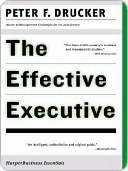More on this book
Community
Kindle Notes & Highlights
The truly important events on the outside are not the trends. They are changes in the trends.
Effective executives know where their time goes.
They gear their efforts to results rather than to work.
They force themselves to set priorities and stay with their priority decisions.
Effective executives, in my observation, do not start with their tasks. They start with their time.
every executive, therefore needs to be able to dispose of time in fairly large chunks. To have small dribs and drabs of time at his disposal will not be sufficient even if the total is an impressive number of hours.
set aside time to direct his vision from his work to results, and from his specialty to the outside in which alone performance lies.
The first step toward executive effectiveness is therefore to record actual time-use.
The higher up an executive, the larger will be the proportion of time that is not under his control and yet not spent on contribution.
Even one quarter of the working day, if consolidated in large time units, is usually enough to get the important things done. But even three quarters of the working day are useless if they are only available as fifteen minutes here or half an hour there.
the reason why working home nights is so popular is actually its worst feature: It enables an executive to avoid tackling his time and its management during the day.
Effective executives start out by estimating how much discretionary time they can realistically call their own. Then they set aside continuous time in the appropriate amount.
There is no such thing as a “good man.” Good for what? is the question.
Effective executives never ask “How does he get along with me?” Their question is “What does he contribute?”
Individuals can acquire very divergent kinds of knowledge and highly disparate skills. But they cannot change their temperaments.


